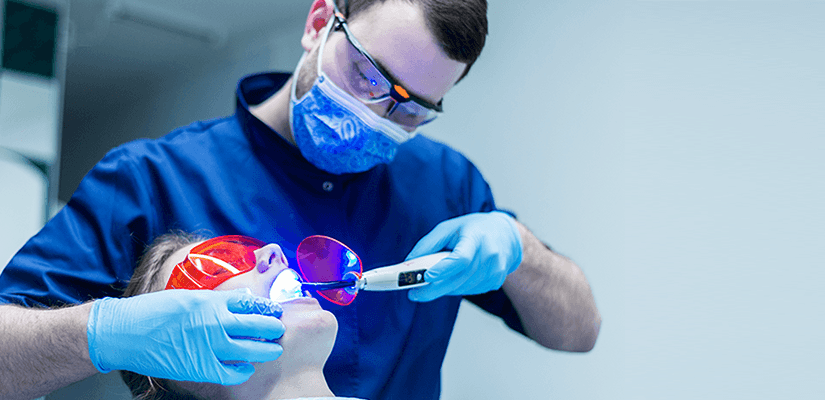
Lasers have been used in dentistry since the last decade. Laser dentistry offers a safe and effective treatment for a wide range of dental procedures and is often used in conjunction with other dental instruments. If you normally get jittery or anxious and are seeking extreme safety and comfort, then consider looking for dentists who have incorporated laser techniques into their practices and treatments.
Benefits of Laser Dentistry:
- Laser dentistry uses soft tissue dental lasers that do not need stitches
- Certain laser dentistry procedures do not require anesthesia shots.
- It minimizes bleeding because of the high-energy light beam aids in the clotting of exposed blood vessels.
- Bacterial infections are lessened due to high-energy beam sterilizing the area being worked on.
- Prevents damage to surrounding tissue
- Encourages wounds to heal faster
Types of Dental Lasers:
- Hard Tissue Lasers: Hard tissue lasers have a wavelength that is highly absorbable by hydroxyapatite i.e. calcium phosphate salt found in teeth, and water, making them more effective for cutting through tooth structure. These lasers are primarily used to cut into bone and teeth with extreme precision. They aid in the “prepping” or “shaping” of teeth for composite bonding, removal of small amounts of tooth structure and the repair of dental fillings.
- Soft Tissue Lasers: Soft tissue lasers work on a wavelength that is highly absorbable by water and hemoglobin in blood, making them more effective for penetrating soft tissues while sealing blood vessels and nerve endings. Since soft tissue lasers allow faster healing, this is why many people experience virtually no postoperative pain.
Procedures for which laser dentistry is performed:
- Cavity Detection: Low-intensity dental lasers may be used for the early detection of cavities by providing a reading of the by-products produced by tooth decay.
- Dental Fillings: Hard tissue lasers eliminate the need for a local anesthetic injection and the traditional turbine dental drill. They are capable of instantly killing bacteria located in a cavity, leading to improved long-term tooth restorations. However, dental lasers cannot be used for the replacement of amalgam fillings, inlays or crowns.
- Tooth Sensitivity: Laser is a great option to seal tubules, located at the root of the tooth that is responsible for hot and cold tooth sensitivity.
- Crown Lengthening: Crown lengthening refers to reshaping gum tissue by soft tissue laser, and bone by hard tissue laser to expose a healthier tooth structure.
- Gummy Smile: For reshaping the gum tissues, the laser can be incorporated, to expose healthy tooth structure and improve the appearance of a gummy smile.
- Muscle Attachment: A laser frenectomy is an ideal treatment option for children with speech impediments and babies unable to breastfeed adequately due to limited tongue movement.
- Soft Tissue Folds: For the painless and stitch-free removal of soft tissue folds often caused by ill-fitting dentures.
Other Applications:
- Examining Tooth and Gum Tissues: Optical Coherence Tomography is a remarkably safer way to see inside tooth and gums in real time.
- Benign Tumors: Dental lasers can be used for the painless and suture-free removal of benign tumors from the gums, palate, sides of cheeks and lips.
- Cold Sores: Low-intensity dental lasers remove pain caused due to cold sores and reduce healing time.
- Nerve Regeneration: Photo-bio-modulation can be used to regenerate damaged nerves, blood vessels, and scars.
- Sleep Apnea: Laser-assisted uvuloplasty procedure can be performed to reshape the throat and relieve the correlating breathing problems associated with sleep apnea.
- Teeth Whitening: Low-intensity soft tissue dental lasers are used to speed up the bleaching process associated with teeth whitening.
- Temporomandibular Joint Treatment: Dental laser treatment can quickly reduce pain and inflammation of the temporomandibular jaw joint.
Future of Dental Lasers:
The applications of laser in dentistry are phenomenal. Dental procedures can soon be performed quicker, more efficiently and comfortably thanks to the growing popularity of the usage of laser in dentistry. Eventually, dental laser treatment can make it possible for dentists to access any part of a tooth, replacing the need for the traditional dental drill.

 Call-an-Ambulance
Call-an-Ambulance



